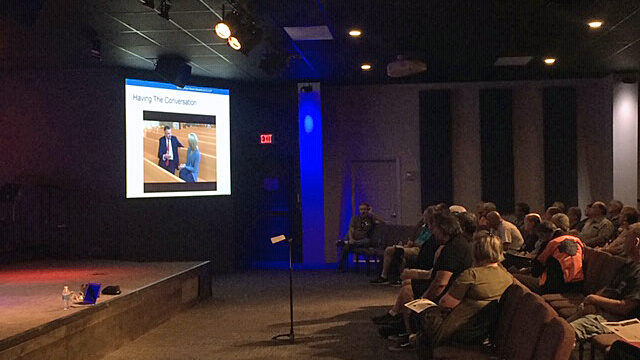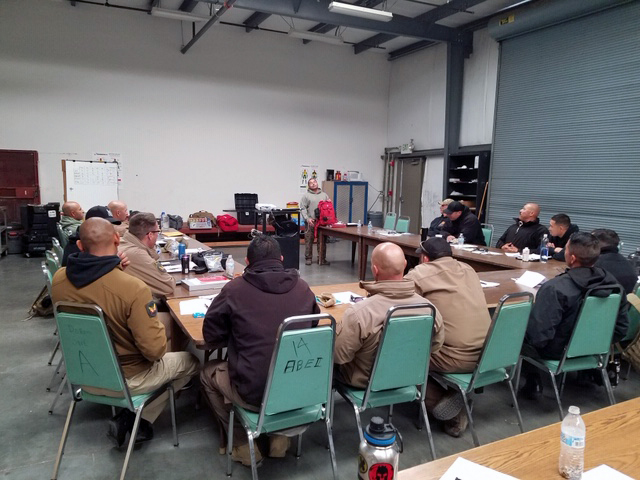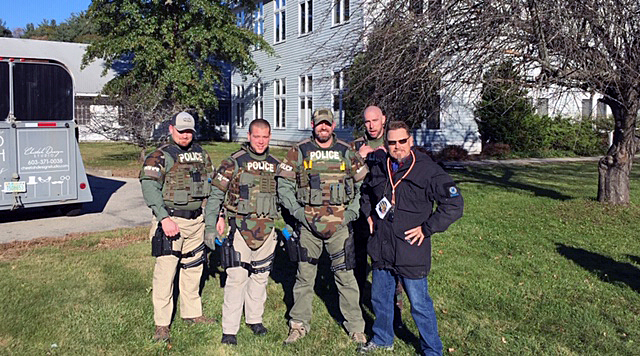A multi-part series Part 1
By Monte Gould
In this series we will discuss the following:
- Introduction & context
- The difference between training and education
- Types of training and or group discussions
- What makes a class
- How to select a training group or individual
- How to evaluate a vendor and their qualifications to conduct training
- What should the client expect and demand
- How to act at a class / course
- Is it worth the money
Part 1 will cover
- The difference between training and education
- Types of training and or group discussions
- What makes a class
- Selecting a vendor
Introduction & context
Few have discussed thus topic in-depth, and delved into the nuisances of the subject matter. Many
attend training with regularity; from any number of vendors, private organizations, or as a course of
employment. This article is in no way meant to disparage people from attending anyone’s training,
seminars and or classes.
Ego, insecurities and incestuous organizational training policies, with lack of outside objective audit and
review leads to poor antiquated techniques affirmed. This diminishes development of practices and
lessons learned by practitioners in the field. I’ve seen lesson plans; courses of instruction and
institutional training in excess of twenty years old, never being updated, and or reviewed. In-service
training personnel, unit trainers and some managers are threatened by non-internal outside training.
They perceive these entities as undermining their personal organizational value, forces them to assess
their training methodologies, beliefs and credibility. These insecurities manifest themselves in dated,
obsolete and poor or substandard performance, combined with unsafe practices, not within industry
standards by employees and individuals. Training must be constantly audited for improvements,
validation and credibility through recent court rulings, field experience, and after action reviews. It has
to be acceptable and credible to the stake holders, administration and the end users.
Part of Monte’s professional responsibility was to evaluate training vendors, and establishments to
conduct outside training for our teams, and agency. This article is opinions based with amalgamate of
fact that has driven his deductions, yes it is sprinkled with subjectivity as well as professional
conclusions; this is not a peer reviewed article. These conclusions are based on experiential activities,
and observations of nearly forty years of my involvement in training, and attending training as both a
professional, and citizen. He attended as a student, over 140 courses of instruction to date, ranging from 1 day to 6 months. Monte has been an instructor in hundreds of training programs, with thousands of
students. As part of his previous responsibility in his agency, he accounted for every dollar spent in
training, and justified it through the prism of objective outcomes, applicability to responsibilities, and
responsible expenditures of funding. His agencies budget was in the millions for training, this revenue is
derived from tax payers. All expenses are reviewed and accounted for by the administration,
management, oversight and audited regularly. His agency required at least two of instructors to attend
all outside contract training, before utilizing the vendor. They audited these groups as “mystery
shoppers” to evaluate their credibility, experiences, and delivery of the course. This was done before
approaching them, or any agreements were signed with them. Their staff attends and then debriefs a
working group on the results, the course content and the vendor’s performance. This was done without
the knowledge of the group providing training.

An introduction to training and education; what’s the difference?
TRAINING VERSUS EDUCATION “The difference between training and education”
From Marian Webster
Let’s define “training” by the English definition
English Language Learners
A process by which someone is taught the skills that are needed for an art, profession, or job
The process by which an athlete prepares for competition by exercising, practicing, etc.
(Staff , 2017)
From Marian Webster
Let’s define “education” by the English definition
English Language Learners
- the action or process of educating or of being educated also: a stage of such a process
a. the knowledge and development resulting from the process of being educated, a
person of little education - the field of study that deals mainly with methods of teaching and learning in schools
(Staff , 2017)
We define and explain training in the following way, “training enhances performance” in the work place
and work related skills, informs the employee / student of responsibilities and gains compliance with
expectations of the organization, certifies the person to perform certain tasks and or specific skills”
Many times this is liability focused, to insulate management from civil actions stemming from lack of
training. Training is repetitive practice of an already attained skill; training sharpens the proficiency
earlier learned.
Many companies provide instruction and or training on contract, for government agencies and
organizations. They design training for clients specifically for the agency / entity. How this is
accomplished? First a “needs assessment” by the company representatives is completed. They then
meet with the agencies / groups lead instructors and managers / leaders. A preliminary plan of
instruction is now developed and provided. This proposal is then reviewed by the group for acceptability
within their structure, and budget. The proposal is further reviewed by the designated staff and the
management team. In our case seldom does IMTT conduct strict, singular overall template pattern training, for government entities with prefabricated collective plans, and or courses of instruction. The
client group is actively involved in the development of said training, to address their specific needs, and
identified deficiencies within their scope of duties. We seek to mitigate un-necessary training on
irrelevant topics, and wasteful use of funding by agencies. These groups do not seek entertainment, fun
and or unrelated topics. As an example IMTT provides “work place safety training” for hospitals, and
large businesses. We also provide leadership training for corporation, active shooter response protocols,
first aid and a gambit of other topics. The vendor must work within the client’s budget, equipment
limitations, personnel training and missions. As an example; IMTT has personnel who teach firing from
helicopters, maritime operations, explosive entry, and a gambit of other topics, these are only relevant
to a very few organizations. Nor is it worthy of spending the public’s money on such wasteful endeavors.
We work with many groups in private, closed session with their team, and or unit and they require
confidentiality. Relative to police, military, and security groups they possess very clear rules of
engagement, operational capabilities, mission requirements, equipment specifications, training budgets,
and strict responsibilities. These groups have legal oversight relative to the use of force, and restrictions
are major concerns. They also have in place training, and agency policies that must be respected, and
blended into provided training as required.
TYPES OF TRAINING “Types of training and or group discussions”
Now we have a rough summary of the nuisance differences, between training and education. Let’s begin
by discussing and defining categories or events. I will break these into types, categories and define
each.
General types of training gatherings
- Symposium
- Workshop
- Clinic
- Conference
- Class / course
A symposium tends to be similar to a conference, but reduced in size. It is simply a small
conference. The main difference between a symposium and a conference is that a
symposium tends to be similar to a conference, but smaller. … Similar to a conference in that
the focus is on presentations and lectures, and less hands-on than a workshop, a symposium is
typically completed in a single day.
A workshop most usually a day or two long, these are dedicated to conversing on a specific topic. These
events are held as part of a section, you will frequently find outside visitors who attend them.
A clinic is a conference or short course on a particular subject. These are most often from a couple of
hours to 8 hours one day. These are very focused on a very specific skill or topic and can be in a practical
environment and or classroom. These don’t involve testing and or evaluation of student retention of
course material.
A conference tends to be a large event. They can total between fifty attendees to thousands, and the
largest may host even more. A convention, in the sense of a meeting, is a gathering of individuals who
meet at an arranged place and time in order to discuss or engage in some common interest. The most
common conventions are based upon industry, profession, and fandom. A gathering of people with a common interest or background, with the purposes of allowing them to meet one another and to learn
about and discuss issues, ideas and work that focus on a topic of mutual concern.
A class / course are a body of students meeting regularly to study the same subject, a course of
instruction provided by a lead instructor or teacher. These are conducted for one or more days. A class is
conducted on a specific topic and or subject. This topic should have definable objectives and outcomes,
or it is not a class. A class often contains evaluations and progressive performance feedback for
retention of material and subject matter. This is not a group discussion and or free flow of cross
information on numerous sub-topics.
WHAT MEETS THE REQUIREMENTS OF A COURSE “What makes a class or course?”
A class can be training or education, or both simultaneously.
Generally a presentation and generically most classes / courses are organized containing the
following
- Introduction
- Presentation
- Summary
- Evaluation
(BARNARD, 2018)
Most often professional training groups blend “principle based learning” and conventional course break
down as described above. This is a hybrid approach, it contains the enumerated categories of principle
based learning, and strict adherence to the building blocks of practical performance. Governmental
organizations require testing, whether question and answer, written and or practical application or all
combined. There’s also many other methods of instruction being introduced, the field is evolving
rapidly. I want to keep this as simple as possible for clarity.
“Principle based learning: The focus is on presenting the principals involved, with the instructor
facilitating the training. Students are encouraged to ask questions and try different options to
determine what works best for them.” (Teach Thought staff , 2018 )

SELECTING A VENDOR “How to select a training group or individual” & “How to evaluate a vendor and
their qualifications to conduct training” There’s differences between organizational / agency and
individual private person training, and the purpose of such trainings.
Government agencies and many private companies now require full resumes, training records of
instructors, and practical experience with recommendations of other past governmental groups, who
have attended their training. These government groups further require the agency conducting training
to test all personnel. Performance testing with definable objective outcomes is required. The student
must perform on demand and to standard in order to be successful. Certifying agencies like POST “Peace
Officer Standards and Training” or STC “Standards Training Corrections” in charge of training oversee
certifications of companies, and groups. They require very strict definable standards of performance,
experience and relevant associated practical capabilities of staff, in the discipline they teach. As an
example some personnel cannot teach “Law Enforcement high risk warrant operations”, although they
may have years of military experience, this doesn’t automatically enable or qualify them to instruct Law
Enforcement, the inverse is as true. If they cannot prove they possess said experience they will not be
certified to teach such topics. There is cross over in many tactics, but for certifications through state and
government agencies, and the process is very restrictive, on who and who cannot instruct such subjects.
The instructional personnel must possess very specific backgrounds, experience, and training before allowed to communicate subjects. This is due to litigation, both civil and criminal, which likely if the
group trained has a confrontation. Arguably there’s far less difficulties when instructing military
regarding their civil and criminal vulnerability. This is particularly true in our current times of hyper
sensitivity to Law Enforcement use of force. Government, state and educational institutions certifying
require specific formatting, and the course to be presented in a specific fashion, to match agency
requirements. Also at the conclusion of the training a strict course student critique review in writing
must be filled out by the students for submission to the agency head. If you have complaints and
continually failures to deliver training in the prescribed manner, the company will lose their certification.
As an individual; not an organization, vendors providing training to have no regulations, and certifying
vetting bodies. It is up to you to research them, find out who and what they are, and what they have
done. There is no certifying overall agency vetting private companies, their staff or their backgrounds.
Anyone can hang a shingle; he or she is then an instructor. I have literally seen vendors completely
fabricate backgrounds, falsify experience and present false CV / resumes. It’s pretty much the Wild
West, add water “poof” instant trainer. Relative to testing of students in the private sector; strict
standards, strictly enforced can create difficulties for the business model. Many vendors do not test, or
the assessments are very subjective, to avoid bruised egos. Competitions and grades can become biased
and subjective as well. Testing and standards create confrontational feelings by the student. This can be
quarrelsome, and reduce return customers. Evaluations of skills create friction, and it is time
demanding, requiring tutorial with retraining methods on occasion. Subjective testing can also create
problems reducing business; clients recognize false standards or poor evaluations. On the other hand,
no student should ever be tested or held to achieve standards of performance, they haven’t been
instructed. Templates and what “right looks like” should be provided and demonstrated to the student
population. This is not giving them the answers; it is setting standards of acceptable performance, and
expectations. In order for students to achieve and perform, they must clearly know what the
expectation is, and what the correct answer is prior to any evaluations. If the student doesn’t know what
is expected, and the instructor cannot define and demonstrate it, than the student cannot be held to
that standard. Students experiencing training, going through the process and understanding clearly
definable expectations should be able to perform on demand, if the training is well designed and
executed. If the testing fails a majority of people and or above 10% be suspicious of the instructional
staff. All things being equal, any time you have a major portion of the students failing evaluations that is
a direct reflection of the instructor, not the students.
On the other hand private vendors in the market offer open training to the public, on generic topics.
The five questions you must answer before spending money on training:
- Why are you attending said course, and what are your expectations?
- Do you want education or training?
- Do you seek both education and training?
- Are you seeking fun and entertainment?
- Is the cost worth the increased skills, providing there is a definable and clear objective?
In order to answer the questions above, you must know the following:
- What is your need?
- Is this for your work or work related posting?
- Is this enhancing your skill toward better performance of a hobby?
- Is this a practical skill you’re looking to enhance your performance within?
- Do you seek a certification of a skill for upward mobility or job placement? And how exactly will
this training / certification enhance that? - Are you only interested in a reduced scope of study, to a specific device and or thing?
- Are you interested in a general theory and overview of the entire topic and its general
application? - What is the cost versus final outcome of objective skills performance? Is the cost of the course
worth it for the time and the resulting clearly definable skills?
About the author
Monte owns and operates IMTT (International Mobile Training Team) a consulting and training firm,
which has been in business since 1994. IMTT trains and certifies instructors from many different units,
teams, organizations and groups. He worked professionally in the public sector for a government
organization, as an “in service training instructor” and a “master training for trainers” instructor for the
state of California. Monte was employed in law enforcement for over 28 years; assigned to a SWAT team
and the “Master Trainer” for his department’s state SWAT unit. This unit employed over 650 members
at one time. They were / are authorized a multi-million dollar budget annually to operate within and
accountable for the same. His finally posting was to mentor, develop and supervise a large group of
instructors, in order to facilitate basic and advanced SWAT schools, sniper courses and numerous other
SWAT related courses across the state of California. Monte was responsible for planning, coordinating,
supervising, and contributing to training pertaining to the unit, and operational activities. He was
responsible to oversee the development of lesson plans, courses of instruction, agendas, to include
support and execution of training sessions. His group delivered tactical and technical guidance, and
professional support; to both subordinates and superiors in the accomplishment of their duties. He
reported directly to the state “Emergency Operations Unit”. Monte is an US Federal court certified
expert for training, tactics and firearms. He is a member of the US Military and has both combat and
non-combat deployments overseas. In addition, Monte is currently a Senior NCO in the US Army and has
conducted training at the team, squad, platoon and company level with over 30 years of service.
If you have comments contact MONTEIMTT@GMAIL.COM

REFERENCES
BARNARD, D. (2018). how to structure your presentation. Retrieved from Virtual Speech :
https://virtualspeech.com/blog/how-to-structure-your-presentation
SC Kong, Y. S. (2014 ). JSTOR . Retrieved from https://www.principlebasedlearning.com/
Staff . (2017). Miriam Webster . Retrieved from MW Dictionary : https://www.merriam-webster.com/
Teach Thought staff . (2018 ). 12 Principles of learning . Retrieved from TeachThought :
https://www.teachthought.com/the-future-of-learning/12-principles-of-modern-learning/
